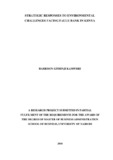| dc.description.abstract | Organizations face various challenges that emanate from the environment that forces firms to adopt strategies to deal with this kind of challenges to counter competition. This study intended to determine the environmental challenges affecting Faulu bank and to identify the strategic responses adopted by Faulu bank to cope with the environmental challenges. The study used a case study research design; primary data was collected with the help of an interview guide. A face-to-face interview was carried out by interviewing four departmental heads at Faulu bank. These departments included marketing department, finance department, operations department and research and development department. Data was analyzed using content analysis which is a systematic and qualitative description of the composition of the objects of the study. The study found that the environmental challenges that faced Faulu bank were competition, obsolete technology, evolving customer needs, complying with regulatory requirements and political instability. It was observed that these challenges hindered Faulu bank’s survival in environment and thus necessitated the bank to find strategies to deal with the situation. It was further concluded that the main strategic responses adopted by Faulu bank to deal with environmental challenges included the adoption of product and service innovation, use of modern technologies, product differentiation, investing in research and development programmes, strategic talent management programme and training and development programme. The study recommends that Faulu bank should increase its budgetary allocation on research and development to enhance innovation in the existing products to allow firms to develop new products and adopt better approaches to produce quality products and services. Further, Faulu Bank should invest more on information communication technology to achieve system integration this will increase sharing of information and communication in the bank hence boost efficiency in banking operations and decision making. The study was limited to Faulu bank and hence the findings obtained in this study are unique and cannot therefore be used for direct application in any other Microfinance bank to make generalization. Future researchers should conduct a similar study in all the Microfinance banks in Kenya or the baking industry in Kenya. The findings obtained can then be used to make comparison and a conclusion can be drawn based on facts. | en_US |



